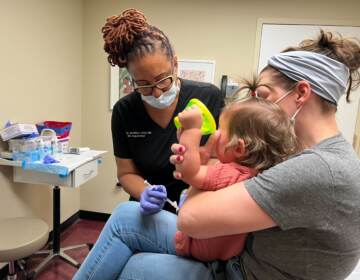Coronavirus update: Four Pa. counties push against stay-at-home order; One more week to register to vote
Lancaster, Schuylkill, Lebanon and Dauphin counties have all announced plans to move from the more restrictive “red” phase to “yellow.”

Pennsylvania Gov. Tom Wolf provides an update on the coronavirus pandemic. (Dan Zampogna/Office of Gov. Tom Wolf)
Updated: 5:50 p.m.
Are you on the front lines of the coronavirus? Help us report on the pandemic.
To date, Pennsylvania has reported 59,939 COVID-19 cases (including confirmed and probable cases). There are 138,532 cases in New Jersey and 6,447 cases in Delaware. Philadelphia has 18,211 cases.
Pennsylvania’s death toll stands at 3,744, New Jersey’s is at 9,255, and Delaware’s is at 224. Philadelphia’s death toll is 894.
Note: Pa. no longer includes probable COVID-19 deaths in its official count, only deaths that have been confirmed through testing.
Four counties push against Wolf’s stay-at-home order
Four central Pennsylvania counties are giving notice to Gov. Tom Wolf that they will ease social distancing measures on Friday, whether the governor approves or not — though they’d rather get his support.
Lancaster, Schuylkill, Lebanon and Dauphin counties have all announced plans to move from the more restrictive “red” phase to “yellow.”
In a letter to Wolf, Lancaster County leaders said the purpose of keeping people at home was to prevent hospitals from getting overwhelmed with COVID-19 patients, and all hospital systems in the county have an “ample supply of beds and ventilators, so much so, that they’re resuming normal operations.”
County leaders also vented their frustrations with state officials for their handling of outbreaks at nursing homes and long-term care facilities.
They claimed the state’s decision to force these facilities to take stable COVID-19 patients led to a spike in new cases and fatalities. It’s unclear from the letter whether this was the case in Lancaster County, but authors claimed the county’s case count dropped dramatically once cases from high-risk populations, such as nursing homes and prisons, were subtracted.
The letter said these populations could be safely isolated and offered greater protection.
For that reason, the Lancaster County Commissioners said they will be testing all residents and staff at these facilities. Additional personal protective equipment will be supplied to these sites and decontamination cleaning will be available to facilities upon request.
Wolf last Thursday extended the stay-at-home order for all “red” counties until June 4. On Friday, 24 North-Central and Northwestern Pennsylvania counties moved into the “yellow” phase. Moving into the “yellow” phase still requires some form of social distancing and limits dine-in at restaurants and store purchases to keep social distancing measures in effect.
Pennsylvania passes 59k cases of COVID-19
As some counties demand to ease social distancing measures, Pennsylvania reached a total of more than 59,000 COVID-19 cases Sunday.
To date, roughly 67% of the state’s more than 3,7000 fatalities have taken place in nursing homes or long-term care facilities.
Officials in Delaware, Bucks, Lancaster and Dauphin counties have argued the number of COVID-19 cases drops significantly once nursing home cases are taken out of their total counts, which could allow them to lift restrictions sooner.
State Health Secretary Dr. Rachel Levine, as well as other public health experts, have cautioned against this way of looking at the numbers, arguing that staff go back to their communities after work, creating the possibility for exposure.
Pa. Black clergy encourage voting by mail for June primary
Pennsylvanians have two key voting deadlines this month if they wish to vote in the primary, which was moved back to June 2 because of the pandemic.
Voters have until next Monday, May 18, to register to vote. The deadline to apply for a mail-in ballot is Tuesday, May 26, the day after Memorial Day. (In Delaware, which also moved its primary to June 2, the deadline to register was Saturday, May 9. Voters can submit their ballots online.)
Black clergy from across the state are urging residents to take advantage of the mail-in option to prevent the spread of COVID-19.
“If you are someone who is a senior, or you have someone who is a senior that you love, encourage them to do the mail-in ballot,” said Kendra Cochran, director of Civic Engagement for POWER, an interfaith organization which hosted a Zoom town hall over the weekend with more than a dozen religious leaders. “We really don’t want people showing up to the polls and then getting sick and so this is a way we can insulate and protect those folks.”
Previously, mail-in ballots were only available to active members of the military or required voters to state a reason. Gov. Tom Wolf signed a package of voting reforms that expanded the option last year to all registered voters, no reason required.
While some Democratic leaders have called for an all mail-in primary to avoid spreading the virus, GOP legislators have pushed back, despite supporting the expansion of vote-by-mail.
Voters might be uneasy about a different method of voting, said Cochran.
The pitch Cochran and other church leaders said voters should think of mail-in ballots as a way to protect the most vulnerable, and use the June primary as a test run before November to figure out how the system works if more people take advantage of it.
Pastors recalled images of Wisconsin’s April primary where voters lined up for several blocks. There were reports in that state that people didn’t get their mail-in ballots until it was too late or that their mail-in ballots were not received on time because of delays in the mail.
The clergy urged residents to request their ballots early. And if there’s a question about whether a ballot will travel in the mail fast enough, residents can still vote using a provisional ballot.
“The rights that we don’t exercise, we frequently use,” said Rev. Leslie Callahan, pastor of St Paul’s Baptist Church in Philadelphia. “As it relates to voting, I think this is particularly true. If we don’t exercise this right, more and more, we risk the loss of it.”
WHYY is your source for fact-based, in-depth journalism and information. As a nonprofit organization, we rely on financial support from readers like you. Please give today.



![CoronavirusPandemic_1024x512[1]](https://whyy.org/wp-content/uploads/2020/03/CoronavirusPandemic_1024x5121-300x150.jpg)



